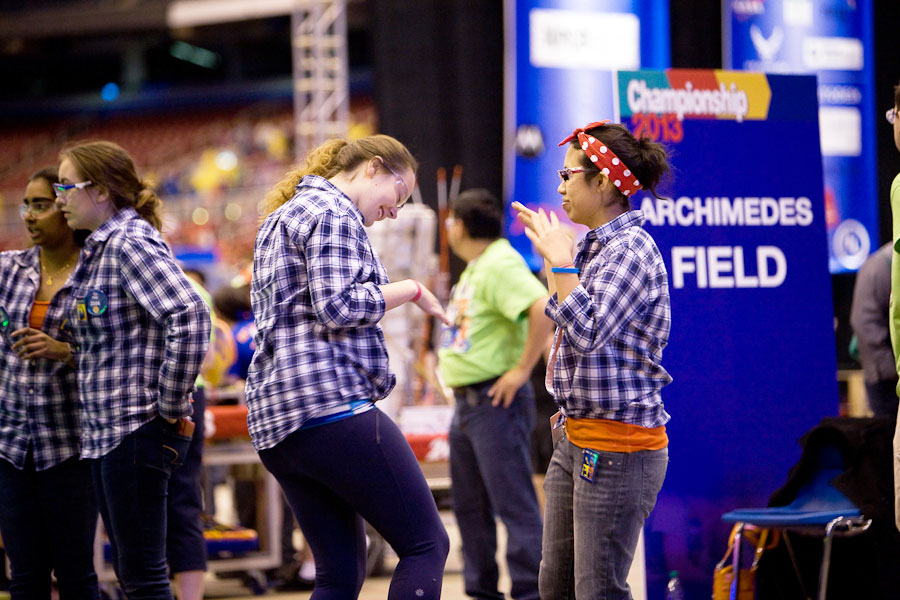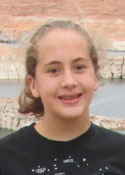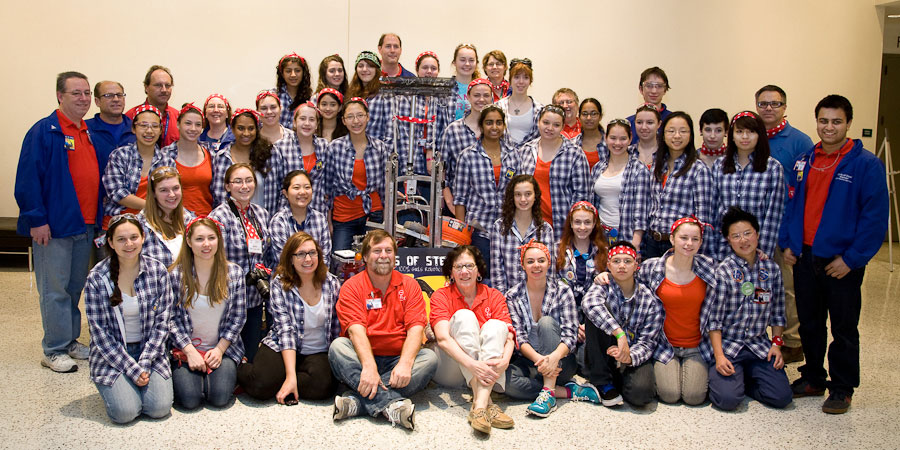
Robohub.org
Getting into the driver’s seat: Girls of Steel tell us how they got hooked on robotics

The Girls of Steel – a competitive FIRST team located in Pittsburg, PA – is on a mission to draw more young women into engineering. We asked team members Mackenzie Ferris (16), Sylvie Lee (16), Molly Urbina (15), Lynn Urbina (17), and Becca Volk (15) to give us the inside scoop of what it’s like to be part of an all-girls robotics team. Here’s what they have to say …
 |
 |
 |
|---|---|---|
|
Lynn Urbina
Age: 17 Grade: 12 Years on GoS: 3 Technical Sub-Team: Mechanical |
Mackenzie Ferris
Age: 16 Grade: 11 Years GoS: 3 Technical Sub-Team: Programming |
Molly Urbina
Age: 15 Grade: 10 Years on GoS: 2 Technical Sub-Team: Mechanical |
 |
 |
|---|---|
|
Rebecca (Becca) Volk
Age: 15 Grade: 10 Years on GoS: 2 Technical Sub-Team: Electronics |
Sylvie Lee
Age: 16 Grade: 11 Years on GoS: 3 Technical Sub-Team: Programming |
How did the “Girls of Steel” form as a team?
Lynn: In the summer of 2010, one of our founding mentors, Patti Rote, wanted to create an all girls FIRST® (For Inspiration and Recognition of Science and Technology) robotics team in Pittsburgh. Patti asked George Kantor, of the Field Robotics Center at Carnegie Mellon University, to help. In the fall of 2010, Girls of Steel FIRST robotics team 3504 was formed with about twenty girls. This year is our fourth year and we expect to have around forty girls on our team.
Was this your first introduction to robotics?
Mackenzie: Yes. I didn’t do anything robotics-related until I joined.
Becca: No. I did FLL (FIRST® Lego League, a division in FIRST® Robotics for younger children) and was on a different robotics team before joining. Girls of Steel is a different level of robotics that my other teams.
Lynn: Sort of. I did some Lego Robot Kits when I was in middle school, but that was all.
Sylvie: I was interested in computer science because my mom is a computer scientist, but I didn’t do anything robotics-related until joining the team.
Molly: No, but I did some Lego Robotics when I was younger and attended Tech Nights (a program in Carnegie Mellon University that aims to get middle school girls into technology).
What were some technical challenges that you faced with FIRST, and how did you solve them?
Becca: Electronic boards often don’t fit on the robot due to changes we’ve made, so we have to rearrange the electronics in order to fit them on the boards. Other times, electronics just don’t work, so we have to replace them. Usually we find out about broken electronics after we put them on.
Lynn: I had to create a square hole with a mill; a mill is a machine that usually drills round holes, but I had to make a square hole. In order to do this, I had to learn about a new drill bit, do a lot of math and then drill the hole. After drilling the hole, I discovered I had drilled it to the left by one extra inch. I had to do it all over again!
What is your best experience from being in Girls of Steel?
Mackenzie: Definitely being a driver last year. Before being a driver, I wasn’t in the Pit (the area where we work on our robot during competition) as often as I wanted to be, and therefore wasn’t as involved. As the driver, not only did I get to drive the robot, I was in the middle of all the action and I really knew what the team was doing.
Becca: My favorite moment was ‘bag and tag day’ (the final day to work on your robot) with Watson, our 2012 robot. We accomplished a lot that day. The Great Migration (when all the electronics are moved from one position to another in 3 hours) was the night before … programmers were programming until five in the morning, and then we still needed to fix things mechanically. It was a hectic day, but we were efficient, productive and got it finished.
Lynn: Two years ago I was the driver, and I had to practice four hours or more each day for the few weeks leading up to championships. At the championships we were mediocre in the rankings, which made me a little disappointed because I put so much work into practicing. My spirits were lifted when I found out that we were the number one balancer (an aspect of the game where the robot had to balance on a bridge) in our division, and in the top twenty in the entire competition of four hundred teams.
Sylvie: My best experience was getting to work in the Pit. When I was working on the robot in the Pit, I got a huge adrenaline rush. All of us were working together quickly and it was really exciting.
Molly: Welding is my favorite. I never had to deal with hot metal before and after burning my hand once, I learned not to get near hot tools without proper safety equipment. Welding is still really fun, even after the burn.
Any fun anecdotes?
Sylvie: Programming jokes! I have so many! One is, “Oh, I’m out of your scope”.
Lynn: Ha! I get it!
Molly: I don’t get it.
Sylvie: A variable can be out of a scope, or out of certain curly brackets, so parts of the program can ‘see’ it. The expression basically means, “I’m out of your league,” in programming language. And then there are the comment out fingers //: “I can no longer see you.”
Becca: I saw a comic of two guys sword fighting and their boss comes in and asks, “Why aren’t you working?” They responded, “Our code’s compiling.”
Sylvie: That’s so true!
Mackenzie: Drive team practice. Period. We have such a blast! Once I was practicing with my phone, with one hand holding my phone and the other controlling the joystick, and Lynn scolded me. Then another time Molly set up cones so close together that I knocked down them all with the robot.
Becca: During the night of the Great Migration I drank four bottles of Mountain Dew. Not cans, bottles. I first crashed, then after ten minutes I was so hyper. I was up until 2am working on the robot, and then I came home and realized I didn’t write a paper that was due the next day. I wrote it, then got to bed at four 4am.
Sylvie: That’s an impressive feat for two hours.
Becca: I know! The thing with procrastination: it takes eight hours to get thirty minutes of work done, but it takes thirty minutes to get eight hours of work done.
Molly: One time another welder and I were behind the welding curtain (a curtain to protect other’s eyes). We were trying to get our mentor’s attention so we were moving the unfinished heart-shaped chassis above the curtain. When that didn’t work, we moved it around while yelling his name.
Lynn: There was the time I broke the Chrome Book screen and Sylvie had to work with colors.
Sylvie: Oh yeah! My mother was teaching me how to use the Chrome Book after the screen cracked and her instructions, literally, were: “Click CTRL+A, wait until the screen turns light purple, and then continue. If the black crack by the left corner flickers, that means you have done it wrong, restart the computer.” It was so bizarre!
Lynn: That’s gold!
If you could build any robot, what would it do?
Becca: Fly.
Molly: A chore robot because I really don’t like chores. Or a robot that can use my face to figure out what food I want to eat, like in Hitchhikers Guide to the Galaxy.
Sylvie: Something that can get me places without me moving. I have a thing about moving. Or a cooking robot, I like food.
Lynn: A robot that can map the ocean floor and can identify new species of fish. There are robots that map the sea floor, but I want to create one that can identify new fish.
What do your friends at school think about you being part of a robotics competition? Do they “get” it?
Lynn: I’m cyber-schooled so I don’t know many of my classmates, but my friends think it’s nice. They don’t understand why I spend so much time on it though. Robotics isn’t just a hobby, it becomes a lifestyle.
Mackenzie: At my first school, my friends would tease me about it in a kind way, but they thought it was really cool. In my second school, my friends thinks it’s cool and interesting.
Becca: I always talk about it and my teachers and friends think it’s cool. They like it, but they don’t think they would want to do it. Some of my friends have come to our competitions, too. That was really fun.
Molly: My teachers love it, but my friends call it a ‘nerdy thing’. A few of my friends understand, but they don’t want to come to competitions. It’s okay though; I enjoy it and that’s what really matters.
Sylvie: My friends know it’s a big part of my life and that it’s a huge time commitment, but they don’t know too much about it. They just know that it’s about robotics.
Has it made a difference for you to be part of an all-girl team? Would it be the same if your team were co-ed?
Becca: My other team was a coed team and was run differently. Many times the boys took mechanical jobs, so girls did more of the business tasks, even though we all got to build the robot. In Girls of Steel it’s different. We’re more open. I also think we are more connected because it’s an all-girls team. Even though we’re stubborn, we depend on each other. Also, girls have a similar mindset, so we understand why we do certain things better.
Molly: We can speak our minds easily because we are all girls, but we have more drama.
Sylvie: We are dramatic, but not in a normal way.
Becca: Its drama in a very robotics way.
Sylvie: Things like, “My design wasn’t used,” or “I didn’t get to work on this part.” Even, “Why wasn’t she here working on the robot?” It’s really funny because it isn’t about boys or the classic drama. There is also some bitterness between the programmers and the mechanical girls that appears once in a while. It’s more because we are a bit stubborn and each one of us has our own view of the robot.
Becca: In the end, the robot is a mesh of all the girls’ ideas.
Sylvie: Also, if there were boys, I wouldn’t feel as comfortable. When it’s all girls, we know each other really well because we do a lot together … mainly eating.
Mackenzie: It would be different on a coed team. On some other coed teams girls do business, guys do the mechanical work. It’s unfair. Also, I took a class for engineering and, although the teacher was good, he favored the boys.
Lynn: Girls of Steel is a family. We have all our sisters, plus our mentors who are like uncles, aunts, older brothers and sisters to us. It really is a family, and I think it’s because of the culture we have.
What would you say to other girls who are curious about robotics but who aren’t sure if it’s for them, or who don’t know how to get started?
Molly: Come to the dark side, we have robots and cookies.
Becca: Honestly, try it. Google ‘robotics’, or look up different teams and research things you have heard.
Lynn: Get a Lego Robot Kit. You can build robots out of Lego, and it is simple programming. If you want to get more advanced, buy an Arduino. It has a reasonable price, plus you can find a lot of tutorials online for using other devices with the Arduino. Also look for teams around the area, including FIRST® teams, VEX teams and Battle Bots teams.
Sylvie: For programming, there are a lot of internships and others opportunities if you look for them. Some of them aren’t robotics-related, but still try programming. There is nothing to be afraid of … there is nothing to lose.
Mackenzie: Join a team to see what it is like. There is something for everyone, even if you don’t think there is anything for you. If there are any robotics events around town, go to them. Also, go to competitions nearby and talk to people … you never know who you will meet.

tags: c-Education-DIY, FIRST, Girls of Steel, Robohub focus on Robotics Education




